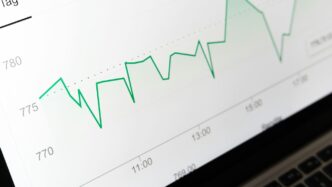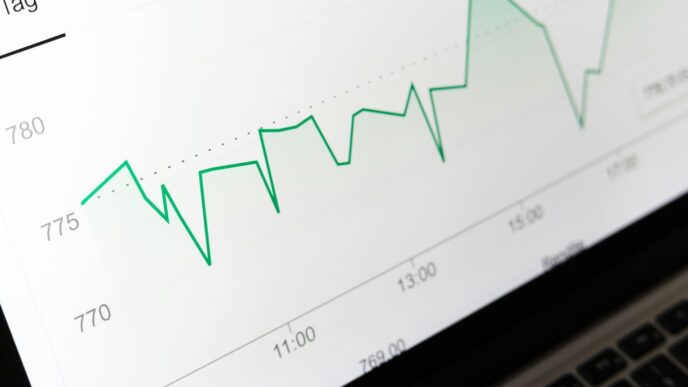This article looks at what Bloomberg Asia has been sharing about the markets lately. We’ll check out some important economic signs and what people are doing to make money grow. Plus, we’ll see how Bloomberg Asia covers big business figures like Elon Musk and what’s next for money and technology. They also focus on climate solutions and what’s happening in the tech world, keeping an eye on everything with their market watch.
Key Takeaways
- Bloomberg Asia provides insights into key economic indicators and current trends.
- Learn about investment strategies and how to handle market ups and downs.
- Explore Elon Musk’s business influence and its impact on industries and nations.
- Discover emerging financial technologies and new business ideas.
- Understand Bloomberg Asia’s focus on climate action and tech industry news.
Understanding Market Dynamics with Bloomberg Asia
So, the markets, right? They can feel like a wild ride sometimes, and figuring out what’s actually going on can be tough. Bloomberg Asia does a pretty good job of breaking it all down for us. They look at the big economic numbers that tell us where things are headed.
Key Economic Indicators and Trends
When we talk about market dynamics, it’s all about the numbers. Think about things like inflation rates, job growth, and how much stuff companies are producing. These aren’t just abstract figures; they really show us the health of an economy. For instance, if unemployment is low and wages are going up, that usually means people have more money to spend, which is good for businesses. On the flip side, if prices are rising too fast, that can make things harder for everyone.
Here’s a quick look at some common indicators:
- Gross Domestic Product (GDP): The total value of goods and services produced in a country.
- Consumer Price Index (CPI): Measures the average change over time in the prices paid by urban consumers for a market basket of consumer goods and services.
- Purchasing Managers’ Index (PMI): An indicator of the economic health of the manufacturing and services sectors.
Bloomberg Asia keeps a close eye on these, showing how they change month-to-month or quarter-to-quarter. Watching these trends helps us see the bigger picture of economic movement.
Investment Strategies for Growth
Once you get a handle on the economic trends, the next step is thinking about how to invest. It’s not just about picking stocks; it’s about having a plan. Bloomberg Asia often talks about different approaches people take to grow their money. Some folks like to put their money into companies that are already big and stable, while others look for newer companies that have a lot of potential, even if they’re a bit riskier. It really depends on what you’re comfortable with and what your goals are.
Some common strategies include:
- Value Investing: Buying stocks that appear to be trading for less than their intrinsic or book value.
- Growth Investing: Focusing on companies expected to grow at an above-average rate compared to their industry or the overall market.
- Dividend Investing: Investing in companies that pay out a portion of their profits to shareholders regularly.
It’s about finding what fits your own financial situation and risk tolerance.
Navigating Financial Volatility
Markets don’t always move in a straight line. Sometimes, things get bumpy, and prices can swing up and down pretty quickly. This is what people mean when they talk about volatility. It can be a bit unnerving, but it’s a normal part of how markets work. Bloomberg Asia often features discussions with experts who share how they manage during these uncertain times. They might talk about diversifying your investments, meaning not putting all your eggs in one basket, or focusing on assets that tend to hold their value even when the market is shaky. It’s about having a plan for when things get a little wild.
Elon Musk’s Business Empire: A Bloomberg Asia Perspective
Elon Musk. You hear the name and it conjures up images of electric cars, rockets, and maybe a few tweets that make the news. But his influence goes way beyond just those headlines. Bloomberg Asia has been keeping a close eye on how this one guy’s ventures are really changing things, not just in business, but on a global scale. It’s pretty wild when you think about it.
Innovations Shaping Global Industries
Musk’s companies are definitely pushing boundaries. Tesla, for instance, didn’t just make electric cars; they made them cool and desirable, forcing the entire auto industry to rethink its future. Then there’s SpaceX, which is fundamentally altering how we think about space travel and exploration. These aren’t small tweaks; they’re major shifts. It’s like he’s building the future, piece by piece.
Here’s a quick look at some key areas:
- Electric Vehicles: Tesla’s market share and innovation continue to set benchmarks.
- Space Exploration: SpaceX’s reusable rocket technology is cutting costs and increasing access to space.
- Neurotechnology: Neuralink aims to bridge the gap between human and artificial intelligence.
- Tunneling: The Boring Company is looking at new ways to ease urban traffic congestion.
Analyzing Musk’s Latest Moves
Keeping up with Musk is a full-time job. One week it’s a new battery day announcement from Tesla, the next it’s a Starship test flight. Bloomberg Asia journalists are constantly digging into what these moves mean. Are they strategic genius, or something else? It’s a complex picture, and understanding the financial and operational details is key. For example, Padmasree Warrior, a tech leader, has spoken about the importance of modernizing sectors like transportation, which aligns with Musk’s EV push and smart software for traffic management.
Impact on Nations and Markets
It’s not just about the companies themselves. Musk’s ventures have ripple effects. Think about the jobs created, the supply chains affected, and even how governments are responding to these new technologies. His companies are often at the forefront of regulatory discussions, whether it’s about autonomous driving or satellite internet. The sheer scale of his operations means that what happens at Tesla or SpaceX can genuinely influence national economies and international markets. It’s a lot to track, and Bloomberg Asia provides that ongoing analysis.
The Future of Finance: Insights from Bloomberg Asia
So, what’s next for money? Bloomberg Asia has been looking into this, and it’s pretty interesting stuff. We’re talking about new ways money moves, how companies are changing the game, and what the economy might do down the road.
Emerging Financial Technologies
It feels like every week there’s some new app or service promising to make managing your money easier, or maybe even make you richer. Blockchain, digital currencies, and AI are all part of this. These technologies aren’t just buzzwords; they’re actively changing how we invest and transact. Think about how quickly payments have gone digital, or how some people are now investing in things that used to be out of reach. It’s a big shift from how things were done even a decade ago. We’re seeing a lot of focus on making financial services more accessible to everyone, not just the folks already in the know. It’s about bringing more people into the financial conversation.
Disruptive Business Models
Companies are really shaking things up. They’re not just selling products anymore; they’re selling experiences, subscriptions, and access. This changes how they make money and how we spend it. For example, the way streaming services changed how we watch movies, or how ride-sharing apps changed getting around. Bloomberg Asia has been tracking these shifts, looking at how these new models affect traditional businesses and the economy as a whole. It’s a constant evolution, and staying on top of it is key for anyone involved in business or investing. We’re seeing a lot of talk about sustainable finance, too, with experts discussing ESG investments and market trends in the Asia-Pacific region.
Economic Forecasts and Analysis
Predicting the economy is always tricky, right? But Bloomberg Asia provides a lot of analysis to help make sense of it. They look at things like inflation, job numbers, and global trade to paint a picture of what might happen next. This kind of information is what businesses and investors use to make decisions. It’s not just about the big numbers, though; it’s also about understanding the smaller trends that can add up to big changes. They often have interviews with economists and analysts who share their views on where things are headed, giving us a better idea of the economic landscape ahead.
Climate Change Solutions: A Bloomberg Asia Focus
Cleantech Investment Opportunities
It feels like every day there’s a new company promising to fix the planet with some kind of tech. Bloomberg Asia has been keeping a close eye on where the money is actually going in the cleantech space. It’s not just about solar panels anymore, though those are still big. We’re seeing a lot of interest in battery storage, which is key for making renewable energy reliable. Then there’s carbon capture technology – the idea is to pull CO2 right out of the air or from industrial sources. It’s still pretty expensive, but the potential is huge if they can scale it up.
Here’s a quick look at some areas getting attention:
- Advanced Battery Technologies: Beyond lithium-ion, companies are working on solid-state batteries and other chemistries that promise more power and faster charging.
- Green Hydrogen Production: Using renewable energy to split water into hydrogen and oxygen could provide a clean fuel source for heavy industry and transport.
- Sustainable Aviation Fuel (SAF): Making jet fuel from waste products or plant matter is a big challenge, but it’s seen as a necessary step for reducing air travel’s carbon footprint.
The real challenge is finding companies that are not only innovative but also have a solid business plan to actually make money.
Transforming Businesses for Sustainability
It’s not just about new inventions; big companies are also having to change how they operate. Think about manufacturing – reducing waste, using less energy, and switching to recycled materials are becoming standard practice. Some companies are really going all-in, redesigning their entire supply chains to be more eco-friendly. It’s a massive undertaking, and frankly, some are doing better than others. We’ve seen reports on how companies in the automotive sector are shifting production to electric vehicles, which is a huge change from their traditional gasoline-powered models. It’s a big gamble, but one they feel they have to take to stay relevant.
Policy and Innovation in Climate Action
Governments play a massive role here, of course. Bloomberg Asia’s reporting highlights how new policies, like carbon taxes or subsidies for green energy, can really push innovation forward. It’s a balancing act, though. Too much regulation can stifle new ideas, but too little means progress stalls. We’re seeing a lot of focus on international cooperation, too, because climate change doesn’t respect borders. The discussions around climate policy are complex, involving economic impacts, social equity, and technological feasibility. It’s a constant push and pull between what’s needed and what’s practical.
Deep Dives into Technology and Business
High-Stakes Drama in the Tech Industry
Tech is always moving fast, right? But sometimes, it feels like a whole different level of drama is playing out behind the scenes. Bloomberg Technology’s podcast, Foundering, really gets into the nitty-gritty of these high-stakes situations. They take you inside stories where companies are dealing with massive amounts of money and influence, and things can get pretty intense. It’s not just about the products; it’s about the people, the decisions, and the sheer pressure cooker environment.
Unprecedented Capital and Power
We’re seeing companies with more money and more sway than ever before. This concentration of resources means a few players can really shape entire industries, and even global trends. Think about how much power a single tech giant can wield today. It’s a big shift from how things used to be, and it raises a lot of questions about competition and innovation. It’s fascinating to see how this plays out, especially when you look at companies like Virgin Galactic pushing the boundaries of space travel, as Richard Branson recently showed with their new spaceship Virgin Galactic’s new spaceship.
Journalistic Investigations into Tech
What’s really interesting is how journalists are digging into these tech stories. They’re not just reporting on new gadgets; they’re investigating the business practices, the market impacts, and the people behind the big tech companies. This kind of reporting helps us understand the real forces at play. It’s about uncovering the details that aren’t always obvious from the outside. They look at:
- The financial backing behind major tech projects.
- How new technologies are changing everyday life.
- The ethical considerations in rapid tech development.
It’s a complex picture, and having reporters who are willing to go deep makes a big difference in how we all understand what’s happening in the tech world.
Bloomberg Asia’s Surveillance: Economic and Market Watch
Top Interviews on Finance
Keeping up with the financial world can feel like a full-time job, right? Bloomberg Asia’s "Surveillance" program brings you straight to the source with interviews featuring top names in finance. You get to hear directly from the people making the big decisions and shaping market trends. It’s a great way to get a handle on what’s happening without all the noise. They cover everything from economic indicators to investment strategies, giving you a clearer picture of where things are headed. It’s like having a front-row seat to the conversations that matter most in the markets.
Conversations from Bloomberg Radio
Beyond the TV interviews, Bloomberg Radio offers a different, yet equally informative, way to stay updated. Hosts like Barry Ritholtz, for instance, have really in-depth chats with folks about investing and business. You can listen in on discussions that break down complex topics into something more understandable. They often bring on journalists who are tracking major business stories, like Elon Musk’s companies, and talk about what these moves mean for everyone else. It’s a more relaxed way to absorb market news, perfect for your commute or while you’re just doing chores around the house. You can catch these chats on Bloomberg Radio.
Real-Time Market Monitoring
Staying ahead in the markets means knowing what’s happening now. Bloomberg Asia’s "Surveillance" team is all about that real-time monitoring. They’re constantly watching the economic pulse, looking at how different sectors are performing, and analyzing the data as it comes in. This includes:
- Tracking major stock indices and currency movements.
- Analyzing breaking economic news and its immediate impact.
- Providing commentary on how global events affect local markets.
This constant watch helps paint a picture of market sentiment and potential shifts. It’s this kind of up-to-the-minute information that can make a difference when you’re making investment choices. For example, understanding the latest developments in communication tech, like the new iPager, can give you an edge. You can even watch the "Surveillance" TV program live each morning to see this monitoring in action.
Wrapping It Up
So, after looking at what Bloomberg Asia has been talking about, it seems like there’s a lot going on. From big business leaders and their companies to the push for cleaner energy, the markets are always changing. It’s a lot to keep track of, for sure. They cover a wide range of topics, from finance news to the latest in tech. It’s good to know where to get this kind of information, especially when things are moving so fast. Hopefully, this gives you a better idea of what’s being discussed and why it matters for anyone interested in how the world of money and business works.
Frequently Asked Questions
What are the main things Bloomberg Asia talks about?
Bloomberg Asia covers a lot of ground! They discuss how the economy is doing, what’s new in the world of money and investing, and how big companies and their leaders, like Elon Musk, are changing things. They also look at new technology, how to deal with climate change, and what might happen in the future with money and businesses.
How does Bloomberg Asia help people understand the economy?
They break down important economic news and trends, making it easier to grasp. They also share ideas on how to invest money to make it grow and offer advice on how to handle times when the markets are a bit wild or unpredictable.
What’s special about their coverage of Elon Musk?
Bloomberg Asia dives deep into Elon Musk’s many companies, like electric cars and space exploration. They explain how his inventions are changing industries and what his actions mean for countries and the overall economy. It’s like getting a backstage pass to his business world.
What new ideas in finance are they talking about?
They explore exciting new technologies that are changing how we handle money, like digital payments and new ways companies are doing business. Plus, they give their best guesses about what the economy might do in the coming years.
How does Bloomberg Asia focus on climate change?
They highlight chances to invest in green technologies that help the environment. They also talk to leaders who are making their companies more eco-friendly and discuss new rules and smart ideas that help fight climate change.
What kind of technology stories do they tell?
Bloomberg Asia shares exciting stories about the tech world, including big rivalries and how companies get huge amounts of money and influence. They also do thorough investigations into tech companies to uncover what’s really going on behind the scenes.










